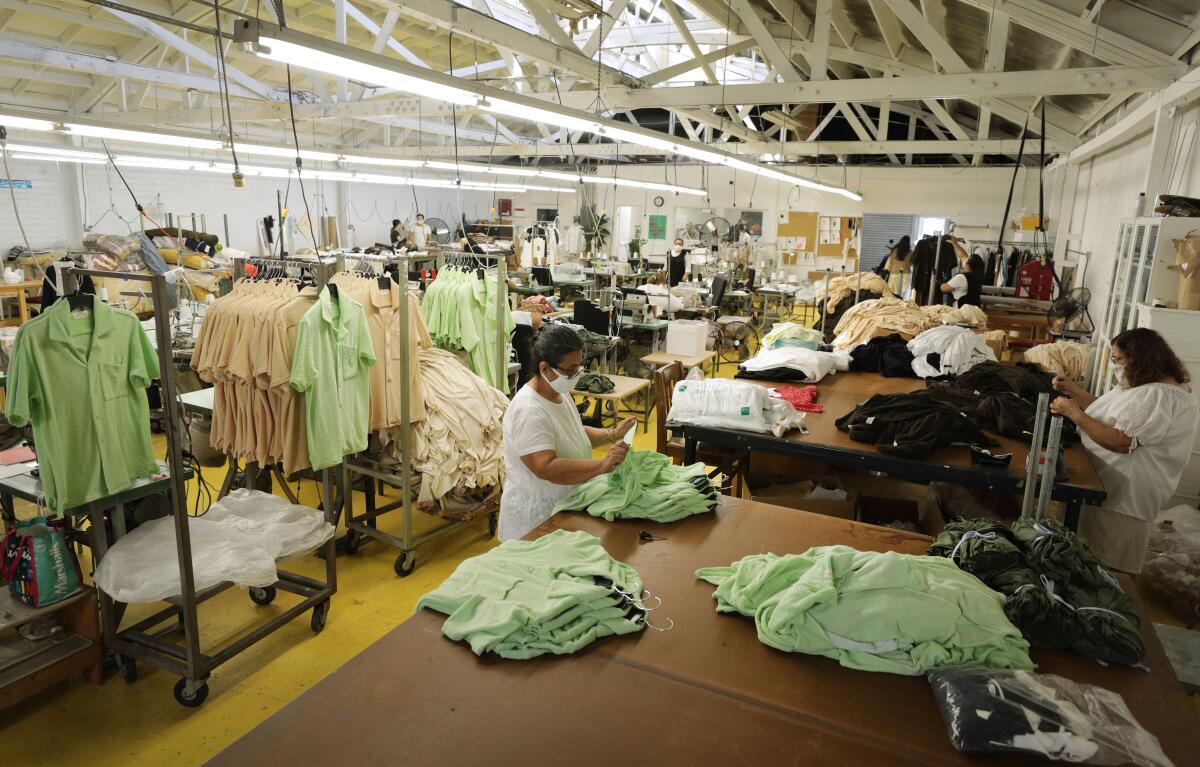Apparel industry wage-reform bill dies in Assembly after failing to come up for a vote

A bill intended to prevent wage theft in Los Angeles’ apparel industry died in the chaotic final hours of this year’s legislative session when it failed to come up for a vote before the midnight deadline.
SB 1399, by state Sen. Maria Elena Durazo (D-Los Angeles), would have required apparel factories to pay garment workers an hourly wage and allow paying by the piece only as an incentive bonus. It also would have made fashion brands and retailers that contract to have clothing manufactured for them liable for any wage theft, even if workers were shortchanged by third-party subcontractors.
The bill needed to clear the lower house and then return to the Senate because of a number of amendments made by the Assembly Appropriations Committee, but it failed to come up for a vote on the Assembly floor before time ran out on the session, which had been upended in the spring by the coronavirus outbreak.
Durazo has not yet decided whether to introduce the bill again next year or try to achieve its aims administratively, according to a spokesperson for the senator.
“I’m disheartened that SB1399 did not prevail in the final hours of the legislative session. 2020 has not been the best year. As we regroup to plan for the upcoming legislative session, our commitment to garment workers will continue to be a priority, because every day wage theft continues to cheat workers out of their pay and while workers continue to be paid by the piece, they continue to earn on average five dollars an hour,” Durazo said in a statement.
The legislation prompted strong opposition by leading trade associations, who said it would harm Los Angeles’ already-diminished fashion industry.
SB 1399 was an attempt to update reforms passed in 1999, four years after 72 Thai immigrants here illegally were found virtually enslaved in an El Monte sweatshop. That legislation made garment manufacturers liable for wage violations by the contractors that produce their garments, but labor advocates say in the ensuing decades the use of subcontractors has made it harder to enforce the law.
The new bill would have created a category of companies called “brand guarantors” that would have been “jointly and severally” liable for any wage theft in the production of clothing. Guarantors were defined not only to include traditional fashion brands but also retailers that contract to have clothing made for them, such as for private labels.
The bill was amended in the Appropriations Committee to clarify record-retention requirements for brand guarantors in response to industry concerns they were too burdensome. Other amendments included a penalty to enforce piece-rate regulations and a clarification that retailers and brands would be responsible for wages, damages, penalties and other compensation owed to workers as opposed to just the loss of minimum wage and overtime pay.
One exception in the legislation would have allowed workers to be paid a piece rate if it was settled on in a collective bargaining agreement.
Paying workers for every hem or cuff they sew is traditional in the apparel industry, but labor advocates say it facilitates wage theft by unscrupulous factory owners. They said that making stores and brands responsible for wage theft should encourage them to pay more to have their clothing manufactured and better monitor the factories where their clothing is produced.
The law was drafted by Bet Tzedek, a nonprofit that offers free legal service to low-income workers, and was co-sponsored by the downtown L.A. Garment Worker Center and other labor advocates.
Opponents, including the California Fashion Assn., the California Retailers Assn. and the California Chamber of Commerce, contended the new regulations would have driven business out of the state and further damaged the Los Angeles industry. Employment has shrunk by about two-thirds over several decades to an estimated 45,000 because of competition from low-cost production in Asia, Mexico and Central America. Opponents called for better enforcement of existing regulations.
Ilse Metchek, president of the California fashion industry trade group, said Tuesday that the bill’s demise showed that “cooler heads prevailed.”
“Somebody is taking a breath and pausing,” she said.
However, industry opposition was not uniform. Durazo’s office on Monday released a growing list of more than four dozen apparel companies that supported the bill. Among the highest-profile backers was Fashion Nova, a largely online fast-fashion retailer that has grown rapidly because of its popularity with a legion of Instagram influencers.
Fashion Nova had been held up by the bill’s proponents as a glaring example of why the reforms were needed, alleging the retailer’s low-cost fashions were being made at the expense of the industry’s many workers in the country illegally yet it was not being held accountable. The Vernon company announced a host of reforms of its contracting practices and surprised the industry this summer with its declared support of the bill.
Dana Hadl, a directing attorney at Bet Tzedek, said the group and the bill’s other sponsors will be discussing with workers how to move forward next year with the reforms.
“As advocates, we are so very disappointed that we weren’t able to convince the Legislature to prioritize this urgent, critical bill,” she said. “We have been fighting for change in this industry for 20 years, and we are not giving up the fight.”







